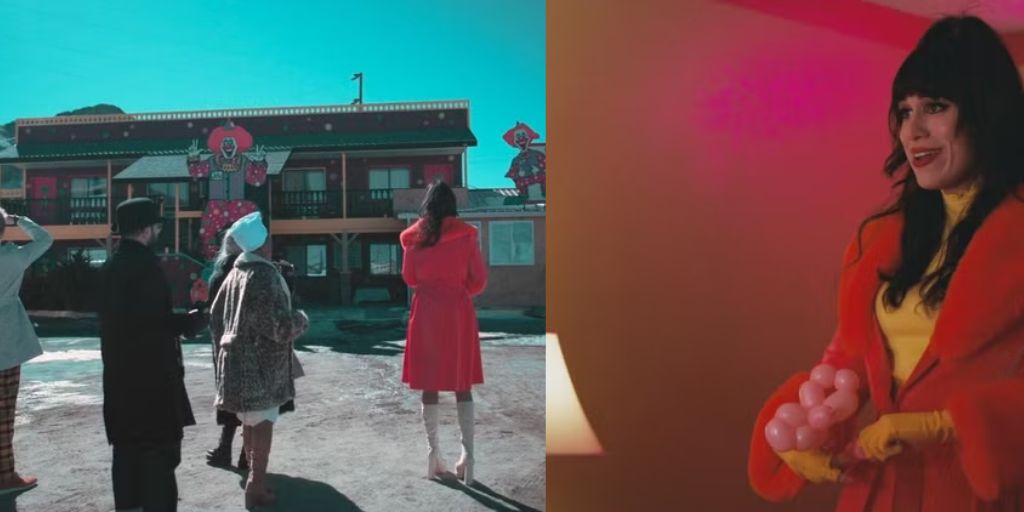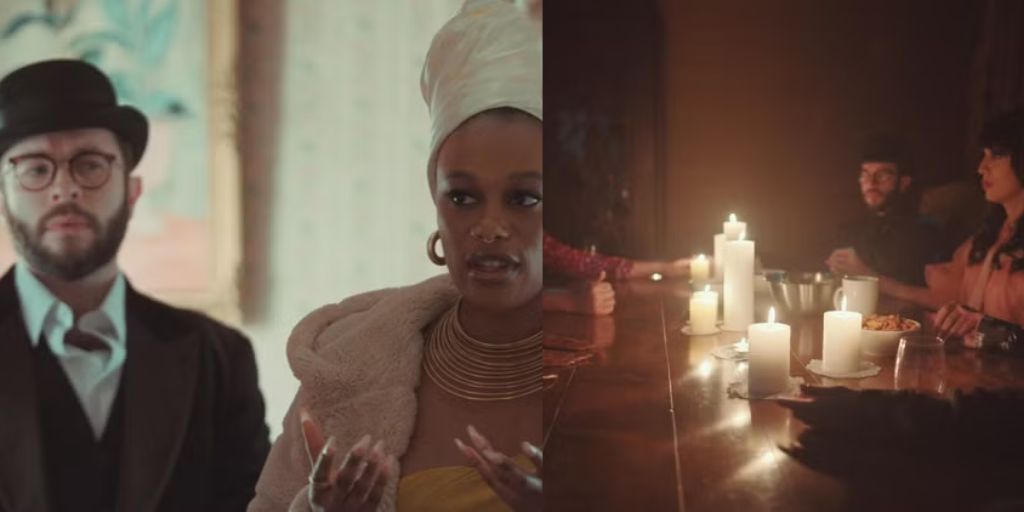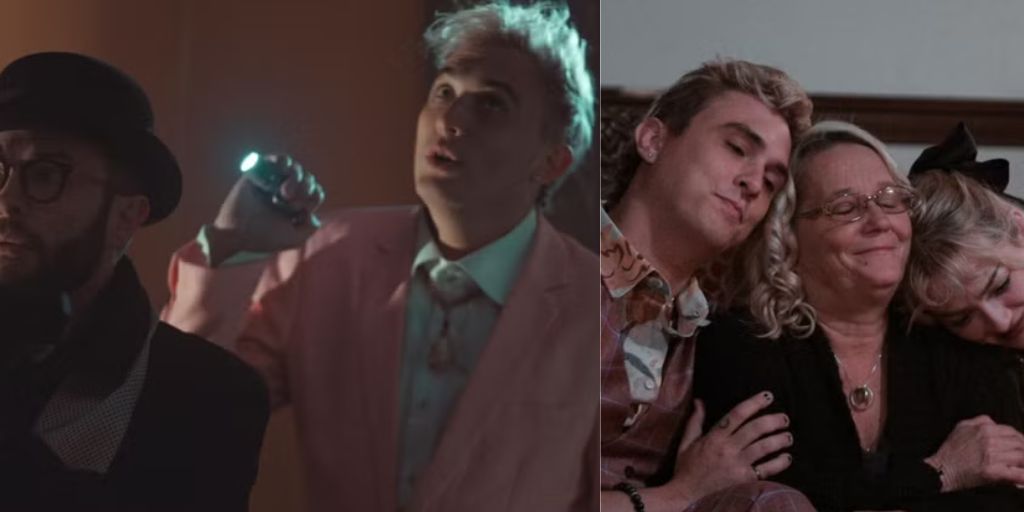As the logline states, “five fabulous, queer ghost hunters criss-cross the country, helping the living by healing the dead.”
This line captures the essence of Living for the Dead, a new show created by the team behind Queer Eye. It was a wonderfully fun and spooky adventure that looked at the world of ghosts through a queer perspective.
The series, which started just in time for Halloween 2023, was the perfect show to enjoy during this spooky season.
Unfortunately, if you planned to wait until Halloween 2024 to watch the series, you will be disappointed.
Just before the official announcement, series star Roz Hernandez revealed that Hulu removed the show without giving any explanation.
They missed the chance to attract viewers during the Halloween rush. The show was a strong example of queer visibility and highlighted how the LGBTQ+ community connects to the world beyond the living.
The series addressed issues that affected both their clients and the ghost hunters themselves.
Living for the Dead did not deserve to be cut short. Perhaps a thorough investigation into its cancellation should take place!
Released on October 18, 2023, Living for the Dead is a paranormal reality series created by Kristen Stewart and C.J. Romero and produced by Rob Eric.
The show followed a team of LGBTQ+ paranormal experts as they traveled to haunted places to communicate with spirits. Their mission was to heal the beings they encountered, whether they were living or dead.
The team included five queer experts: Roz Hernandez, who is a paranormal researcher and podcaster; Logan Taylor, a psychic medium; Ken Boggle, a tarot card reader and medium; Juju Bae, a witch and spiritual healer; and Alex LeMay, a ghost hunter.
Each expert brought their own skills to the group as they took on the task of helping those in need. Whether it was connecting with the past or understanding the reasons for paranormal events, each of the eight episodes featured a unique story and engaging narrative.
Living for the Dead Celebrated Queer Visibility in Horror
Paranormal reality shows are not new. They have attracted viewers for many years. People are often fascinated by the unknown and what lies beyond.
During Living for the Dead’s press tour last year, Rob Eric mentioned that the all-queer cast and LGBTQ+ perspective were not the only things that made the show unique.
In an interview with TV Insider, he said, “Most of these shows, your ghost hunters are provoking the spirit. They’re poking it with a stick over and over again. Our team didn’t go into it that way. They went into it like, ‘Let’s communicate.’”
Communication is very important for many people in the queer community. Whether it is discussing their identity with their parents or sharing experiences with others who have similar journeys, communication is central to relationships.
This is why these ghost hunters feel a strong connection to the people who ask for their help. They have experienced their own struggles and want to give back to others. Additionally, both queer people and the supernatural are often misunderstood.
This misunderstanding exists in the living world and the spirit world. As Roz Hernandez explained, “I think a lot of times, people when don’t understand something they view it as scary or bad. That’s something we can relate to.”
The series included both paranormal and queer history. Each location visited had its own ghostly stories, but it also highlighted the connections the experts felt to these places. They visited famous spots like the Clown Motel in Nevada and the well-known Lemp Mansion in St. Louis.
The show balanced ghost stories with the rich history of the queer community. The queer community has a deep connection to the horror genre because they have often felt demonized, much like the “monsters” that haunt horror films. Living for the Dead was a celebration for those “monsters” that have been misunderstood in the past.
Canceling Living For the Dead Hurts Queer Representation in Media
Sometimes a piece of art may not get the recognition it deserves, even if it has support from fans. This was true for Living for the Dead.
The series received three nominations in 2024: a GLAAD Award for Outstanding Reality Series, a Queerty Queerties Award for Reality/Docuseries, and a Daytime Emmy Award for Outstanding Cinematography.
Despite this recognition, Hulu and Disney+ decided to remove the show from their platforms, making Living for the Dead one of its many casualties. Fans of the show and the cast expressed their disappointment on social media and Reddit after the series was officially removed.

As Hernandez said on Instagram, “According to @hulu they will no longer have the only season we got to do of this TV show with an all LGBTQ+ cast available to stream.
It even had a transgender lady in the center of the poster! We got to be a Hulu original series on their platform for 11 months, which is really great considering how low visibility has been for trans and queer people in media lately.”
As Hernandez pointed out, queer visibility in media is often limited, especially in this specific genre. Living for the Dead was a unique series. While reality television does have shows featuring queer individuals, such as RuPaul’s Drag Race, which is one of the most well-known, few programs intersect horror with reality.
The closest show is The Boulet Brothers’ Dragula, which is a competition series rather than a documentary. However, it also celebrates the queer community’s connection to the supernatural.
Since Living for the Dead was a Hulu original series, it is unlikely that fans will find it anywhere else to watch. At a time when queer voices need support, the cancellation of this show is very disappointing. Living for the Dead represented a community that felt seen and heard.
Fortunately, some voices are calling for the show to be revived. A petition has been created to help bring the series back. The LGBTQ+ community has always been strong and united, and this situation shows that support is essential.
The removal of Living for the Dead is a major loss for many reasons. First, the show showcased the talents of its all-queer cast. The experts worked together to provide comfort to the living and the dead.
They show each haunted location with respect and curiosity. Viewers could see how the ghost hunters cared deeply about their work and the people they helped. This dedication made the show compelling and heartwarming.
Second, the show brought visibility to queer issues and stories. It highlighted the struggles that LGBTQ+ individuals face while also celebrating their uniqueness.
The series allowed viewers to see how their experiences could connect with others, both living and dead. The experts often shared personal stories, creating a bond between them and their clients. This connection reminded viewers of the importance of empathy and understanding.
Third, Living for the Dead had a positive impact on representation in horror. The horror genre has long been known for its portrayal of monsters and the supernatural. However, many queer individuals have often felt like outsiders, similar to the monsters they see in films.
The show turned this narrative on its head by celebrating the queer community’s relationship with the supernatural. The ghost hunters in the series demonstrated that people can embrace their identities while engaging with the world of spirits.
The cancellation of Living for the Dead raised questions about the future of queer representation in media. Shows that highlight LGBTQ+ stories and experiences are crucial for building understanding and acceptance. The removal of this series sends a troubling message that these stories are not valued.
Fans are worried about what this means for other LGBTQ+ shows. Will networks continue to support and invest in these stories? The LGBTQ+ community deserves to see itself represented in all genres, including horror.
As fans of Living for the Dead mourn its loss, they are also rallying for its return. Social media platforms have become a hub for sharing stories and memories related to the show.
People express how much the series meant to them and why they want it back. Many fans have signed the petition, hoping that their collective voice will be heard. They are determined to show Hulu and other networks that there is a strong demand for queer representation in media.
In addition to the petition, fans are using hashtags to raise awareness about the show’s removal. They are encouraging others to share their thoughts and feelings about Living for the Dead.
By doing this, they hope to attract attention from media outlets and streaming services. This grassroots effort aims to show that the community will not back down when it comes to fighting for representation.
The support for Living for the Dead demonstrates the power of community. When people unite for a common cause, they can create change. The LGBTQ+ community has always been strong, and this situation highlights the importance of solidarity. Fans are determined to fight for their representation and make their voices heard.
As they continue their campaign, fans are also reminded of the positive impact that Living for the Dead had during its short run.
The show allowed people to see queer individuals in roles that they often do not get to play. It brought a sense of joy and celebration to the horror genre, which can sometimes be heavy and dark. By addressing important issues and celebrating queer history, the series left a lasting impression on its audience.
While the future of Living for the Dead remains uncertain, the support it has generated is a testament to the power of representation. The LGBTQ+ community deserves to see its stories told in ways that resonate with them.
Whether it is through reality television or scripted series, these narratives are vital for building understanding and acceptance. Fans hope that Hulu and other networks will recognize this need and work to support diverse stories in the future.

In the meantime, those who loved Living for the Dead will continue to celebrate the memories it created. They will share their favorite moments and connect with others who feel the same way. The community will remain hopeful that their voices will be heard, and the show will find new life once again.
Living for the Dead was not just a show about ghosts; it was a celebration of queer identity and visibility. It tackled important issues while providing a fun and engaging viewing experience. The removal of the series is a disappointment for many, but the fight for representation continues.
Fans are united in their efforts to bring the show back and ensure that LGBTQ+ stories remain a part of the media landscape. With passion and determination, they hope to revive Living for the Dead and keep its spirit alive.




